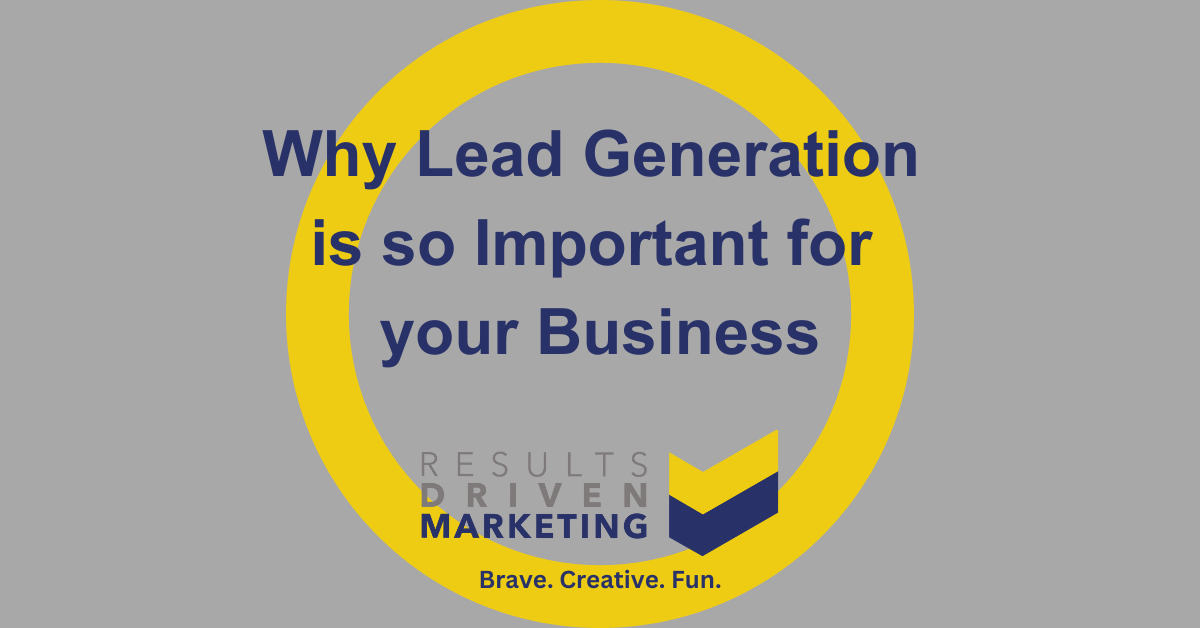
Why Lead Generation is Important for Your Business
Understanding why lead generation is important is critical for any business looking to grow and succeed in today’s competitive marketplace. At its core, lead generation serves as the lifeblood of your sales funnel, providing a vital connection between your business and potential customers. Without a robust lead generation strategy, businesses may struggle to find and retain customers, ultimately impacting their bottom line and potential for growth.
In this article, we’ll explore the multifaceted reasons why lead generation is important, how it can dramatically reshape your business prospects, and why neglecting it could leave you lagging behind in the ever-evolving dance of consumer engagement.
Whether you’re a start-up planting your first flags in the market or an established company aiming to expand your reach, understanding the significance of generating quality leads is a cornerstone of sustained success.
Table of contents:
What is Lead Generation?
Lead generation, at its core, is the art and science of sparking interest in your products or services among potential customers. It’s about creating pathways that lead prospective clients to your doorstep, ready to explore what you have to offer.
This process involves a series of strategies and tactics, all aimed at identifying and attracting individuals or entities that are likely to become valuable customers.
Importance of Lead Generation
In the grand scheme of business operations, lead generation isn’t just a nice-to-have; it’s a must-have. But why is this process so crucial?
Why is Lead Generation Important?
- Fuel for Growth: Think of lead generation as the fuel that powers the engine of your business. Without a steady flow of leads, your sales pipeline might run dry, leaving your growth prospects stranded.
- Targeted Approach: Lead generation allows you to zero in on your ideal customers. It’s not about casting a wide, indiscriminate net; it’s about finding those who are genuinely interested and likely to engage with your offerings.
- Building Relationships: Every lead presents an opportunity to build a relationship. By nurturing these leads, you lay the groundwork for trust and loyalty, which are cornerstones of long-term business success.
- Competitive Edge: In a world where competition is fierce, standing out is vital. Effective lead generation strategies can give you that edge, ensuring you remain visible and relevant in your market.
- Measurable Results: One of the beauties of lead generation is its measurability. You can track and analyze your efforts, gaining insights that help you refine your strategies for even better outcomes.
Why is Effective Lead Generation So Important?
When we talk about why lead generation is important, it’s not just about quantity; it’s the quality that truly counts. Effective lead generation is like finding the right keys to unlock the doors of opportunity for your business. Here’s why it’s so crucial:
- Maximises Marketing Efforts: Effective lead generation ensures that your marketing efforts are not just shots in the dark. It’s about hitting the bullseye, reaching those who are most likely to respond positively.
- Boosts Sales Potential: Quality leads are synonymous with potential sales. The more effective your lead generation, the higher the chances of converting prospects into paying customers.
- Enhances Brand Reputation: When your lead generation is spot on, it reflects well on your brand. It shows that you understand your market and are capable of delivering what your audience needs.
- Facilitates Better Resource Allocation: Knowing where your potential customers are allows you to allocate your resources more efficiently. This strategic approach can lead to significant cost savings and better ROI.
- Drives Sustainable Growth: Ultimately, effective lead generation is a cornerstone of sustainable business growth. It’s about laying a solid foundation for your business to expand and thrive.
The Importance of Lead Generation for Your Business
Lead generation isn’t just a buzzword; it’s a vital cog in the machinery of your business. Here’s why it’s so important:
- Fuels the Sales Pipeline: Your sales pipeline is the lifeline of your business, and lead generation keeps it flowing. Without fresh leads, your pipeline could dry up, leading to stagnation.
- Targets the Right Audience: Lead generation helps you focus on the people who are most likely to be interested in your offerings. This targeted approach can significantly increase your chances of success.
- Builds Valuable Relationships: Every lead is an opportunity to build a relationship. Nurturing these relationships can lead to loyal customers and even brand advocates.
- Provides Valuable Insights: Lead generation isn’t just about finding prospects; it’s also about gathering valuable insights. These insights can help you refine your products, services, and marketing strategies.
- Keeps You Competitive: In today’s fast-paced market, staying competitive is key. Effective lead generation can give you the edge you need to stay ahead of the curve.
Why Lead Generation is Essential in Business Development
In the realm of business development, lead generation is not just important; it’s essential. Here’s why:
- Drives Revenue Growth: At its core, lead generation is about driving revenue growth. It’s the process that feeds your sales team and ultimately impacts your bottom line.
- Supports Business Expansion: As your business grows, so does your need for new customers. Lead generation is the engine that powers this expansion, helping you reach new markets and audiences.
- Enhances Market Understanding: Effective lead generation also enhances your understanding of the market. It provides a window into the needs, preferences, and behaviours of your potential customers.
- Facilitates Strategic Planning: With a steady flow of leads, you can plan more strategically. You can make informed decisions about product development, marketing strategies, and resource allocation.
- Builds a Stronger Brand: Finally, lead generation contributes to building a stronger, more recognizable brand. It helps you establish a presence in your market and build trust with your audience.
Advantages of Lead Generation
Diving into the world of lead generation, it’s like opening a treasure chest of opportunities for your business. But why, you might ask, is lead generation so pivotal? Well, let’s unfold the layers and discover the myriad advantages it brings to the table.
Benefits of Lead Generation
Lead generation isn’t just a process; it’s a powerhouse of benefits. Here’s a glimpse of what it offers:
- Streamlined Sales Process: It’s like having a roadmap for your sales team, guiding them to the prospects who are most likely to convert.
- Enhanced Customer Targeting: Imagine having a laser focus on your ideal customers. Lead generation does just that, helping you zero in on those who truly matter.
- Data-Driven Decisions: With lead generation, you’re not shooting in the dark. You have data at your fingertips, enabling informed decisions that can propel your business forward.
- Long-Term Customer Relationships: It’s not just about the initial sale. Lead generation paves the way for building long-term relationships with your customers, turning them into loyal advocates of your brand.
Some Benefits of Lead Generation that Drive Success
When we talk about why lead generation is important, we’re talking about a whole spectrum of benefits. Here are nine key advantages that can drive your business toward success:
- Targeted Marketing Efforts: Lead generation helps you tailor your marketing efforts to reach the right audience, increasing the effectiveness of your campaigns.
- Improved Sales Productivity: With a steady flow of quality leads, your sales team can focus on what they do best – selling.
- Better Customer Insights: Lead generation provides valuable insights into customer preferences and behaviors, helping you refine your offerings.
- Increased Brand Awareness: As you generate leads, you’re also increasing your brand’s visibility in the market.
- Higher Conversion Rates: Quality leads often translate into higher conversion rates, boosting your sales and revenue.
- Cost Savings: By targeting the right audience, you can reduce wasted efforts and resources, leading to significant cost savings.
- Competitive Advantage: A robust lead generation strategy can give you an edge over your competitors.
- Scalability: Lead generation allows you to scale your marketing and sales efforts according to your business needs.
- Sustainable Growth: Ultimately, lead generation is about laying the foundation for sustainable, long-term growth.
Increases Sales and Improved ROI
One of the most compelling reasons why lead generation is important is its direct impact on sales and ROI. It’s like having a secret weapon that not only brings more customers to your doorstep but also ensures that your marketing investments yield fruitful returns.
By connecting you with the right prospects, lead generation can significantly boost your sales figures and improve your overall return on investment.
Cost-Effective Strategies
In the realm of business, every penny counts. That’s where lead generation shines, offering cost-effective strategies that maximise results while minimising expenses. It’s about smart spending, ensuring that your marketing budget is utilised in the most efficient way possible.
With targeted campaigns and data-driven approaches, lead generation helps you get the most bang for your buck, making it a financially savvy choice for businesses of all sizes.
Better Customer Insights
Peeling back the layers of why lead generation is important, we stumble upon a gem: better customer insights. It’s like having a crystal ball that gives you a peek into your customers’ minds. Lead generation helps you understand their needs, preferences, and pain points.
This knowledge is golden; it allows you to tailor your products, services, and marketing messages to resonate deeply with your target audience.
Increased Brand Awareness
Lead generation is like a megaphone for your brand. It amplifies your presence in the market, making sure you’re heard and seen by the right people.
By reaching out to potential leads, you’re not just selling; you’re also building brand awareness. This increased visibility is crucial in today’s crowded marketplace, helping you stand out and stay top of mind.
Long-Term Benefits
The beauty of why lead generation is important lies in its long-term benefits. It’s not just a quick fix; it’s a strategy that pays dividends over time.
By consistently generating and nurturing leads, you’re building a pipeline of potential customers. This pipeline can fuel your business growth for years to come, providing a steady stream of opportunities.
How Lead Generation Helps With Cash Flow
Cash flow is the lifeblood of any business, and lead generation plays a vital role in keeping it healthy. By bringing in a constant flow of leads, you’re essentially ensuring a steady stream of potential revenue.
This can help smooth out cash flow fluctuations, providing more financial stability for your business. It’s like having a financial safety net, giving you peace of mind and room to grow.
Types and Methods of Lead Generation
Understanding why lead generation is important is one thing; knowing how to do it effectively is another. Let’s explore the various types and methods of lead generation that businesses can leverage.
Types of Lead Generation
Lead generation comes in many flavours, each with its own set of advantages. Some common types include:
- Inbound Lead Generation: Attracting leads through content, SEO, and social media.
- Outbound Lead Generation: Reaching out to potential leads through cold calling, emailing, or direct mail.
- Event-Based Lead Generation: Generating leads through webinars, trade shows, or networking events.
Different Ways Businesses Can Generate Leads
The avenues for lead generation are as diverse as the businesses that use them. Here are some popular ways to generate leads:
- Content Marketing and Paid Advertising: Crafting valuable content and using paid ads to attract and engage potential leads.
- SMS & WhatsApp Marketing: Leveraging the power of messaging apps to reach out to prospects directly.
- Search Engine Optimisation (SEO): Optimising your website and content to rank higher in search engine results, attracting organic traffic.
- Email Marketing: Using targeted email campaigns to nurture leads and keep your brand top of mind.
- Webinars/Webcasts: Hosting informative online events to engage and capture the interest of potential leads.
- Competitions and Giveaways: Running contests to generate excitement and attract leads.
- Referral and Affiliate Schemes: Encouraging existing customers to refer new leads in exchange for rewards.
- Direct Mail: Sending physical mailers to potential leads to grab their attention.
Challenges and Considerations in Lead Generation
Embarking on the journey of lead generation is like navigating a complex maze. It’s filled with potential rewards, but also challenges and considerations. Understanding why lead generation is important is just the beginning; let’s delve into the nuances that come with it.
What are the Disadvantages of Using Lead Generation?
While lead generation is a cornerstone of business growth, it’s not without its challenges. Here are a few potential disadvantages:
- Resource Intensive: Effective lead generation can require significant resources, both in terms of time and money. It’s like planting a garden; you need to invest before you can reap the rewards.
- Quality vs. Quantity: Sometimes, the focus on generating leads can lead to a quantity-over-quality scenario. It’s crucial to strike a balance to ensure that the leads are not just numerous, but also likely to convert.
- Changing Consumer Behaviours: The landscape of lead generation is ever-evolving. What worked yesterday might not work today, requiring businesses to be agile and adaptable.
- Risk of Annoying Prospects: If not done tactfully, lead generation efforts can sometimes backfire, annoying potential customers rather than attracting them.
Is Using Lead Generation a Good Idea?
In a nutshell, yes, lead generation is generally a good idea. It’s like sowing seeds for future growth. However, it’s important to approach it strategically, ensuring that your efforts align with your business goals and target audience.
When done right, lead generation can be a powerful tool for business success.
What are the Key Considerations for using Lead Generation?
When diving into lead generation, there are several key considerations to keep in mind:
- Target Audience: Understanding your target audience is crucial. It’s like having a compass; it guides all your lead-generation efforts.
- Budget and Resources: Assess your budget and resources. Lead generation doesn’t have to break the bank, but it does require thoughtful investment.
- Channels and Tactics: Choose the right channels and tactics that resonate with your audience. It’s not a one-size-fits-all; what works for one business might not work for another.
- Measurement and Analysis: Implement systems to measure and analyse your results. It’s like having a feedback loop that helps you refine your strategies over time.
What are the Alternatives to Using Lead Generation?
While lead generation is important, it’s not the only way to grow your business. Here are some alternatives:
- Customer Retention: Focus on retaining existing customers. Sometimes, nurturing current relationships can be more fruitful than seeking new ones.
- Partnerships and Collaborations: Forming strategic partnerships or collaborations can open new avenues for growth without traditional lead generation.
- Referral Programs: Encourage your satisfied customers to refer others. Word-of-mouth can be a powerful tool.
- Market Expansion: Consider expanding into new markets or offering new products/services to your existing customer base.
Lead Generation for Different Business Types
When we talk about why lead generation is important, it’s essential to recognize that its significance spans across various business types. From startups to established enterprises, lead generation plays a pivotal role.
What Type of Businesses Need Lead Generation?
In truth, almost every type of business can benefit from lead generation. Whether you’re a B2B tech startup, a local bakery, or a multinational corporation, generating leads is a key step in growing your customer base and expanding your business.
A New Business Needs Lead Generation
For new businesses, lead generation is like planting the seeds for future growth. It’s crucial for building a customer base from scratch and establishing a foothold in the market. Without lead generation, a new business might struggle to gain the visibility and traction needed to survive and thrive.
Lead Generation Beyond Selling
Understanding why lead generation is important goes beyond just selling products or services. It’s about building relationships and creating value.
Lead Generation Doesn’t Always Mean Selling
Lead generation isn’t always about making an immediate sale. Sometimes, it’s about initiating a conversation, providing valuable information, or solving a problem. It’s about starting a relationship that could eventually lead to a sale.
Visitors Are Good, Conversions Are Better
While attracting visitors to your website or store is great, conversions are what really matter. Lead generation is about turning those visitors into leads, and eventually, into customers. It’s about making that crucial transition from interest to action.
Cost and Budgeting for Lead Generation
One of the key questions surrounding why lead generation is important involves its cost and how to budget for it effectively.
Is Lead Generation Expensive?
The cost of lead generation can vary widely depending on your business, industry, and chosen strategies. It doesn’t have to be expensive, but it does require careful planning and budgeting. The key is to find a balance that maximises your return on investment.
Conclusion: Why is Lead Generation Important to Business?
In conclusion, understanding why lead generation is important is fundamental to business success. It’s the starting point of your relationship with potential customers. Effective lead generation can increase brand awareness, fill up your sales funnel, boost conversion rates, and ultimately drive business growth.
It’s a crucial component of any successful marketing strategy, acting as the bridge that connects your business to its future customers. So, investing in lead generation isn’t just a good idea; it’s essential for the health and growth of your business.
FAQ
What Does Lead Generation Mean in Sales?
In sales, lead generation means identifying and attracting potential customers for your products or services. It’s the first step in the sales process, laying the groundwork for future transactions.
What are the Two Types of Lead Generation?
The two main types of lead generation are inbound and outbound. Inbound involves attracting leads through content, SEO, and social media, while outbound involves actively reaching out to potential leads through methods like cold calling or emailing.
Ready to Generate More Leads?
This question is a call to action, encouraging businesses to take the next steps in their lead generation journey, armed with the knowledge and strategies they need to succeed.
Who are we?
Dedicated to lead generation, Results Driven Marketing provides myriad services SMEs can trust to deliver results.
Our marketing lists are guaranteed accurate to industry high standards, and GDPR compliant and our experience team means that if you are looking to buy data, they make them totally bespoke and highly relevant whether you are looking for email lists, direct mailing lists or telemarketing lists.
Our email marketing software is highly rated. Responder provides the automation tools you need to put your marketing on autopilot.
We also supply email marketing solutions with our email marketing platform.
Call us today on 0191 406 6399 to discuss your specific needs.
Results Driven Marketing
info@rdmarketing.co.uk
0191 406 6399





